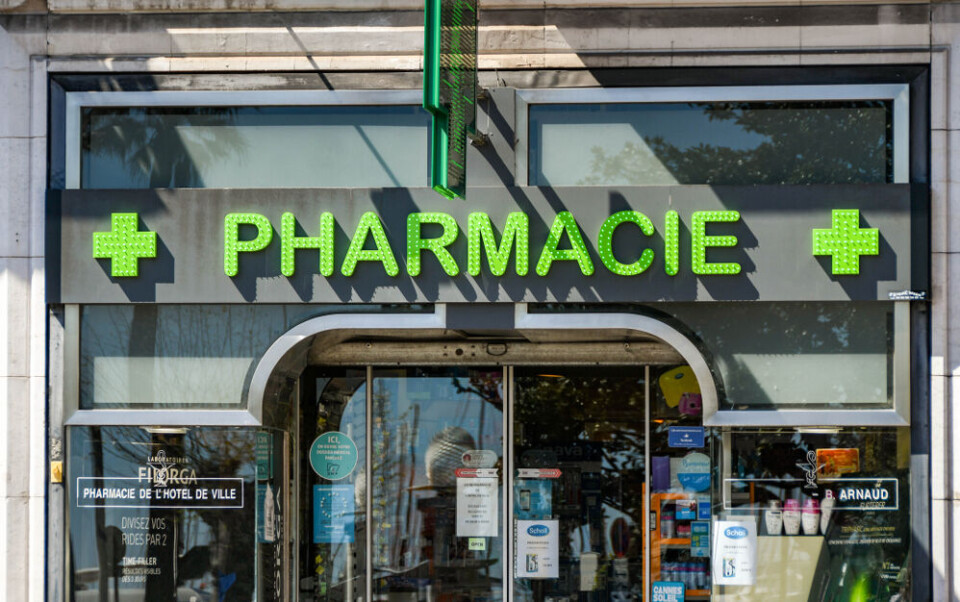-
White storks make strong return in France via nest ‘platforms’ and clipped wings
The Ligue pour la Protection des Oiseaux shares the conservation challenges in saving these birds from extinction
-
Hosting scheme in south-west France lets newcomers sample lifestyle
Households in nine Dordogne communes volunteer under Mes Nouveaux Voisins scheme
-
French boulangeries demand right for staff to work on May 1 so they can open
Artisan bakery owners can work but employees cannot, while certain industrial bakeries are allowed to remain open with workers
16 things you can do at a French pharmacy other than buy aspirin
We look at the services, treatments and advice offered by local pharmacists in France

[Article last updated: September 3, 2023]
France’s 22,000 pharmacies are, in the main, well stocked and staffed although the profession is suffering recruitment issues like many other sectors.
As well as sorting out prescriptions and selling household remedies, they also offer a range of free services. So you can also...
1. Receive vaccinations
And not just for Covid. Over-16s can also get vaccinated against flu without a prescription. (This is reimbursed for certain at-risk groups, and under-16s need a prescription.)
With a prescription you can also get vaccinated against diphtheria, tetanus, polio, whooping cough, human papillomavirus (HPV), hepatitis A, hepatitis B, meningitis types A, B, C, Y and W, pneumococcal infections and rabies.
Read more: Pharmacies in France can now administer 14 more vaccines
2. Update your carte Vitale
Use a self-service terminal or ask for it to be done at the checkout.
This ensures that the latest information about your eligibility for healthcare has been downloaded to your card, reducing possible glitches in the system.
Read more: How France’s new e-carte Vitale will work
3. Have wild mushrooms identified
This can ascertain whether or not they are edible.
When gathering, keep different species in separate bags or baskets, and if in the slightest doubt, do not eat them.
There are several deaths every year from eating poisonous fungi in France.
Read more: French mushroom-hunters asked to share where they are going for safety
4. Find a French equivalent for your British or American remedy
If you take an empty package into the pharmacy, they can look up French remedies containing the exact same molecule.
In the rare cases where there is not a direct equivalent, they can suggest alternatives that will serve the same purpose.
Read more: What are the French equivalents of some common UK medicine brands?
5. Get first aid
Pharmacies can treat small cuts, infected insect bites, grazes and burns.
They can also advise when to consult a doctor and/or go to A&E, and if you are away from home, they can help you make an emergency appointment.
6. Rent or buy medical equipment
This can range from crutches and wheelchairs to a hospital bed as required.
7. Have weekly pill boxes refilled
Some pharmacies offer pilulier préparé services, where they fill a weekly pill box with all the tablets a patient has to take morning, noon and night and even deliver it to their home.
There is a small fee (usually just a few euros per week).
8. Be fitted for specialist equipment
This could include medical collars, surgical stockings, orthopaedic shoes, and other devices as prescribed by your GP.
9. Arrange a personal consultation
Arrange a bilan partagé de médication which costs €60 for a first consultation, €20 for a follow-up appointment (entretien de suivi) or €30 if a new medication is prescribed.
These are reimbursed for patients over 65 with one or more chronic conditions, including for example cancer, asthma, diabetes, and people taking blood thinners.
The aim is to review multiple prescriptions, and discuss dosages, side-effects, long-term treatments and other health concerns.
10. Bypass your GP
Designate a pharmacien correspondant who can renew certain prescriptions and adjust dosages if required without you seeing your GP.
Read more: French pharmacists now able to renew some doctor’s prescriptions
11. Get help to stop smoking
Book a free private consultation to get personalised advice about stopping smoking, plus buy remedies to give up.
You can also get continuing help and support during the process of kicking smoking for good.
12. Take an asthma test
If you have a lingering cough or wheezy breathing, do a free preliminary test at the pharmacy and, if positive, consult your GP.
13. Have your blood pressure checked
Even if you are feeling fine, it is still worth doing because high blood pressure does not initially cause any symptoms.
14. Be tested for diabetes
Regular awareness campaigns in France increase early diagnosis.
15. Be prescribed antibiotics for some conditions
Pharmacists now have the authority to prescribe antibiotics for some non-serious conditions, such as a bacterial sore throat or cystitis.
They will run a test rapide d’orientation diagnostique (TROD) to “confirm the bacterial origin" of the illness, and ask questions to ensure that the condition is not a sign of something more serious. If they suspect something else, they will advise you to contact your GP instead.
16. Receive routine vaccinations
It is now possible to receive all routine vaccinations from a pharmacist. As of August 9, 2023 - as stated by a decree in the Journal Officiel - pharmacists, nurses, and midwives are able to prescribe, prepare, and inject vaccinations.
France requires 11 vaccinations for children. There are also optional extras such as Covid boosters or the seasonal flu jab, as well as other vaccines recommended for travel.
The change is the latest move in the French government’s aim to expand the roles of the pharmacist, in a bid to lighten the burden on GPs and hospitals (although some GPs say that sharing these ‘easy roles’ is not the right way to improve healthcare provision, and have called for a larger overhaul).
Related articles
How long are medicine prescriptions valid in France?
How are you reimbursed for your medicines in France?
12 things you can do at a French post office other than buy stamps
























